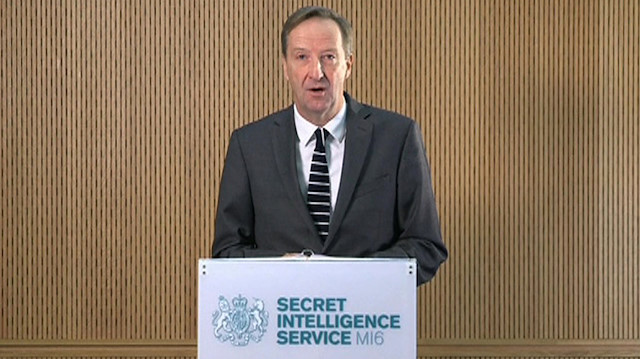
The chief of Britain's foreign intelligence service warned the Kremlin on Monday not to underestimate the West after a brazen nerve agent attack on a retired double agent in England stoked fears about Russian covert activity abroad.
In his second major speech since being named in 2014 to head the Secret Intelligence Service, or MI6, Alex Younger said Russia has a stance of "perpetual confrontation" with the West.
After the attack on Sergei Skripal, a former Russian military intelligence officer who betrayed dozens of agents to MI6, Britain's allies in Europe and the United States took its side and ordered the biggest expulsion of Russian diplomats since the height of the Cold War.
Britain identified the nerve agent deployed in the English town of Salisbury as Novichok, a highly potent group of nerve agents developed by the Soviet military in the 1970s and 1980s.
"The Russian state used a military-grade chemical weapon on UK soil," Younger told students at the University of St Andrews in Scotland where he once studied economics and computer science before joining the British army.
"Our intention is for the Russian state to conclude that, whatever the benefits it thinks it is accruing from this activity, they are not worth the risk," he said.
Moscow has repeatedly denied involvement and accused British intelligence agencies of staging the attack to stoke anti-Russian hysteria.
"I should emphasise that even as the Russian state seeks to destabilise us, we do not seek to destabilise Russia. We do not seek escalation," Younger said.
Younger, 55, said that Britain's spies have thwarted multiple Daesh plots originating overseas.
Less than four months before the United Kingdom is due to leave the European Union on March 29, Younger said MI6 continues to work with partner agencies to strengthen "indispensable security ties" in Europe.
He said the United Kingdom had helped France and Germany prevent terrorist attacks.
MI6, the home of fictional spies such as John le Carré’s George Smiley and Ian Fleming’s James Bond, has the job of defending Britain, and its interests, abroad.
A career spy who joined MI6 as the Soviet Union was crumbling, Younger stressed the need for espionage to embrace the new.
"The era of the fourth industrial revolution calls for a fourth-generation espionage: fusing our traditional human skills with accelerated innovation, new partnerships and a mindset that mobilises diversity and empowers the young," he said.
In a recruitment pitch, Younger gave some details of his own life, including drinking obscure homemade alcohol in an attempt to penetrate an organisation intent on genocide in the Western Balkans in 1990s.
"If you want to make a difference and you think you might have what it takes, then the chances are that you do have what it takes, and we hope you will step forward."



